Related Research Articles

David Lloyd George, 1st Earl Lloyd-George of Dwyfor, was Prime Minister of the United Kingdom from 1916 to 1922. A Liberal Party statesman and politician from Wales, he was known for leading the United Kingdom during the First World War, for social-reform policies, for his role in the Paris Peace Conference, and for negotiating the establishment of the Irish Free State. He was the last Liberal Party prime minister; the party fell into third-party status shortly after the end of his premiership.

Herbert Henry Asquith, 1st Earl of Oxford and Asquith,, generally known as H. H. Asquith, was a British statesman and Liberal Party politician who served as Prime Minister of the United Kingdom from 1908 to 1916. He was the last Liberal prime minister to command a majority government, and the most recent Liberal to have served as Leader of the Opposition. He played a major role in the design and passage of major liberal legislation and a reduction of the power of the House of Lords. In August 1914, Asquith took Great Britain and the British Empire into the First World War. During 1915, his government was vigorously attacked for a shortage of munitions and the failure of the Gallipoli Campaign. He formed a coalition government with other parties but failed to satisfy critics, was forced to resign in December 1916 and never regained power.
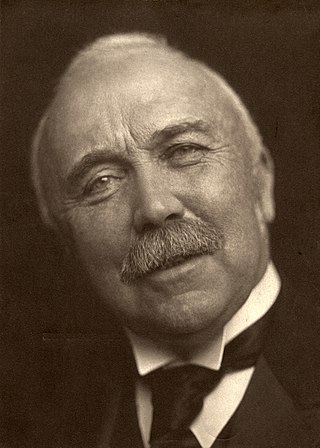
Sir Henry Campbell-Bannerman was a British statesman and Liberal politician. He served as the prime minister of the United Kingdom from 1905 to 1908 and leader of the Liberal Party from 1899 to 1908. He also served as secretary of state for war twice, in the cabinets of Gladstone and Rosebery. He was the first first lord of the treasury to be officially called the "prime minister", the term only coming into official usage five days after he took office. He remains the only person to date to hold the positions of prime minister and Father of the House at the same time, and the last Liberal leader to gain a UK parliamentary majority.

Archibald Philip Primrose, 5th Earl of Rosebery, 1st Earl of Midlothian, was a British Liberal Party politician who served as Prime Minister of the United Kingdom from March 1894 to June 1895. Between the death of his father, in 1851, and the death of his grandfather, the 4th Earl of Rosebery, in 1868, he was known by the courtesy title of Lord Dalmeny.

Lord Randolph Henry Spencer-Churchill was a British statesman. Churchill was a Tory radical and coined the term 'Tory democracy'. He inspired a generation of party managers, created the National Union of the Conservative Party, and broke new ground in modern budgetary presentations, attracting admiration and criticism from across the political spectrum. His most acerbic critics were in his own party, among his closest friends; but his disloyalty to Lord Salisbury was the beginning of the end of what could have been a glittering career. His elder son was Winston Churchill, who wrote a biography of him in 1906.

Ronald Craufurd Munro Ferguson, 1st Viscount Novar, was a British politician who served as the sixth Governor-General of Australia, in office from 1914 to 1920.

Richard Burdon Haldane, 1st Viscount Haldane, was a British lawyer and philosopher and an influential Liberal and later Labour politician. He was Secretary of State for War between 1905 and 1912 during which time the "Haldane Reforms" of the British Army were implemented. As an intellectual he was fascinated with German thought. That led to his role in seeking detente with Germany in 1912 in the Haldane Mission. The mission was a failure and tensions with Berlin forced London to work more closely with Paris.

Sir William George Granville Venables Vernon Harcourt was a British lawyer, journalist and Liberal statesman. He served as Member of Parliament for Oxford, Derby then West Monmouthshire and held the offices of Home Secretary and Chancellor of the Exchequer under William Ewart Gladstone before becoming Leader of the Opposition. A talented speaker in parliament, he was sometimes regarded as aloof and possessing only an intellectual involvement in his causes. He failed to engender much emotional response in the public and became only a reluctant and disillusioned leader of his party.

Robert Offley Ashburton Crewe-Milnes, 1st Marquess of Crewe,, known as The Honourable Robert Milnes from 1863 to 1885, The Lord Houghton from 1885 to 1895 and as The Earl of Crewe from 1895 to 1911, was a British Liberal politician, statesman and writer.
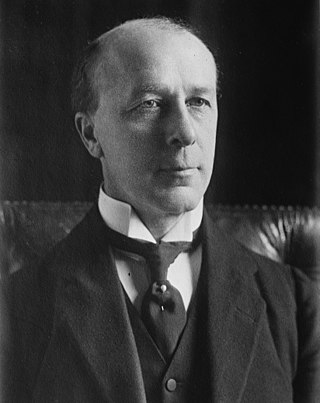
Reginald McKenna was a British banker and Liberal politician. His first Cabinet post under Henry Campbell-Bannerman was as President of the Board of Education, after which he served as First Lord of the Admiralty. His most important roles were as Home Secretary and Chancellor of the Exchequer during the premiership of H. H. Asquith. He was studious and meticulous, noted for his attention to detail, but also for being bureaucratic and partisan.

Edward Marjoribanks, 2nd Baron Tweedmouth,, was a moderate British Liberal Party statesman who sat in the House of Commons from 1880 until 1894 when he inherited his peerage and then sat in the House of Lords. He served in various capacities in the Liberal governments of the late 19th and early 20th centuries.
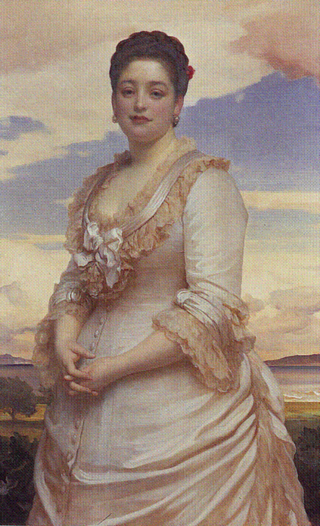
Hannah Primrose, Countess of Rosebery was the daughter of Baron Mayer de Rothschild and his wife Juliana. After inheriting her father's fortune in 1874, she became the richest woman in Britain. In 1878, Hannah de Rothschild married Archibald Primrose, 5th Earl of Rosebery, and was thereafter known as the Countess of Rosebery.
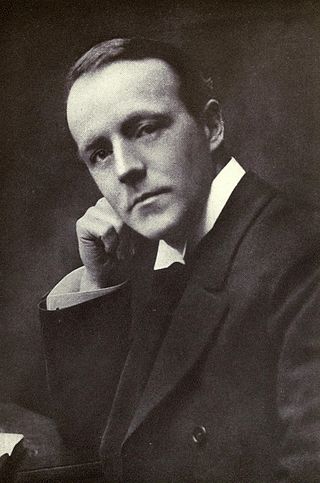
Walter Runciman, 1st Viscount Runciman of Doxford, was a prominent Liberal and later National Liberal politician in the United Kingdom. His 1938 diplomatic mission to Czechoslovakia was key to the enactment of the British policy of appeasement of Nazi Germany preceding the Second World War.
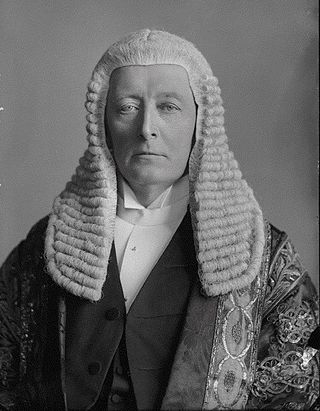
William Court Gully, 1st Viscount Selby PC, KC was a British lawyer and Liberal politician. He served as Speaker of the House of Commons between 1895 and 1905.

Lady Sybil Myra Caroline Grant was a British writer and artist. She was the eldest child of Archibald Primrose, 5th Earl of Rosebery and his wife, Hannah.

The Liberal government of the United Kingdom of Great Britain and Ireland that began in 1905 and ended in 1915 consisted of two ministries: the first led by Henry Campbell-Bannerman and the final three by H. H. Asquith.
The Relugas Compact was the plot hatched in 1905 by British Liberal Party politicians H. H. Asquith, Sir Edward Grey, and R. B. Haldane to force the prospective prime minister, Sir Henry Campbell-Bannerman, to give up the leadership of the party in the House of Commons. The Compact is significant because it represents a new way of doing party political business at the highest level. In an era when aristocratic power was still taken for granted, the manoeuvring for the highest office in the land represented for the first time distinct political philosophies vying for control of one of the major parties. Learning from an association with Tories Salisbury and Balfour at Hatfield, the Liberal Imperialists stole a march on their rivals to take a step nearer modernisation. Moreover, they brought with them junior ministers such as Sidney Buxton and Henry Fowler, making it look like a take over from the Gladstonian Radicals, of whom the ageing Prime Minister was the last.

The vote of no confidence in the Rosebery ministry of 21 June 1895, also known as the Cordite vote, was the occasion on which the Liberal Government of the Earl of Rosebery was defeated in a vote of censure by the House of Commons. The motion was to reduce the salary of the Secretary of State for War as a censure over deficient supply of cordite to the Army. When it was passed, the Secretary of State Henry Campbell-Bannerman offered his resignation. As Campbell Bannerman was the most popular Minister in a Government which was suffering internal division and whose members had grown tired of office, the Government chose to interpret the issue as one involving confidence in the Government and therefore resigned. The incoming Conservative government soon sought a dissolution of Parliament and won the ensuing general election. The vote is the last time in the History of the British Parliament that a government has been defeated on a confidence motion when it had a workable majority.
The Liberal Imperialists were a faction within the British Liberal Party around 1900 regarding the policy toward the British Empire. They supported the Second Boer War which most Liberals opposed, and wanted the Empire ruled on a more benevolent basis. The most prominent members were R. B. Haldane, H. H. Asquith, Sir Edward Grey and Lord Rosebery.
Leo McKinstry is a British journalist, historian and author.
References
- Robert Rhodes James, Rosebery (London: Phoenix, 1995).
- Leo McKinstry, Rosebery: Statesman in Turmoil (London: John Murray, 2006).
